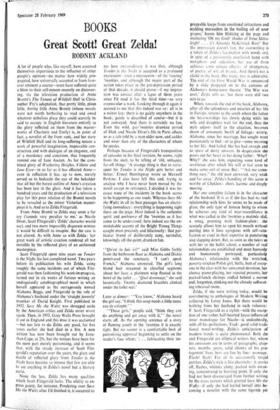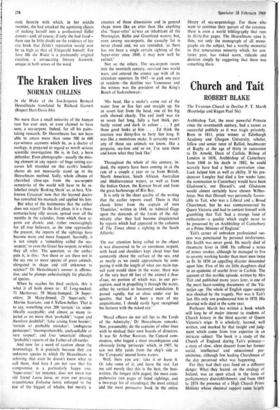Great Scott! Great Zelda! BOOKS
RODNEY ACKLAND
A lot of people who, like myself, have assumed themselves impervious to the influence of other people's opinion—no matter how widely, pro- pagated, how universally accepted or from how- ever eminent a source—must have suffered quite a blow to their self-esteem recently on diseover- ing, via the television production of Anne Bronte's The Tenant of Wildfell Hall in Chris- topher Fry's adaptation, that pretty little,-pious little, boring little Anne Brontë (whose novels were not worth bothering to read and owed whatever nebulous place they could scarcely be said to occupy in English literature entirely to the glory reflected on them from the master- works of Charlotte and Emily) is, in point of fact, a novelist of the front rank, and her story of Wildfell Hall and its long-suffering tenant a work of powerful imagination, impeccable con- struction and with dialogue of an elegance, and of a mordancy and concision, that frequently remind one of Jane Austen. As for the com- bined glory of Wuthering Heights, Villette and Jane Eyre—in so far as it has affected Anne— even in reflection it has, up to now, merely served so to bedazzle the eye of the beholder that all but the barest outline of Anne's creation has been lost in the glare. And it has taken a hundred years and the production of a television play for this poor relation of the Brontë novels to be revealed as the minor Victorian master- piece it is. And so to Zelda Fitzgerald.
From Anne Brontë to Zelda may seem a far cry (`sounds very peculiar to me,' as Nicole Diver, Scott Fitzgerald's 'Zelda' character would say), and two more impossibly disparate women it would be difficult to imagine. But the case is not altered. As with Anne so with Zelda: her great work of artistic creation rendered all but invisible by the reflected glory of an acclaimed masterpiece.
Scott Fitzgerald spent nine years on Tender is the Night, his last completed novel. Two years before its publication his wife Zelda, using roughly the same incidents out of which 'Fitz- gerald was then fashioning his work-in-progress, turned out in six weeks of furious writing an undisguisedly autobiographical novel in which herself appeared as the outrageously named Alabama Beggs, and Fitzgerald in the role of Alabama's husband under the 'straight juvenile' moniker of David Knight. First published in 1932, Save Me the Waltz was shrugged aside by the American critics and Zelda never wrote again. Then, in 1953, Grey Walls Press brought it out in England and this time it was acclaimed —but too late to do Zelda any good, for five years earlier she had died in a fire. A new edition has now been brought out by Jona- than Cape, at 25s, but the notices have been for the most part merely patronising, and it seems that, with the steady increase of Scott Fitz- gerald's reputation over the years, the glare and dazzle of reflected glory from Tender is the Night have become so intense that few are able to see anything in Zelda's novel but a literary curio.
None the less, Zelda has many qualities which Scott Fitzgerald lacks. The ability to ex- press gaiety, for instance. Pondering over Save Me the Waltz after I'd finished it, it occurred to me how extraordinary it was that, although Tender is the Night is accepted as a profound expression—even a microcosm—of the 'roaring' 'twenties, and although the major part of the action takes place in the pre-depression period of that decade, it should prove—if my impres- sion was correct after a lapse of three years since I'd read it for the third time—so very crepuscular a work. Looking through it again it seemed to me that this indeed was so: all is in a minor key; there is no gaiety anywhere in the book; gaiety is described of course—but it is not conveyed. And there is certainly no fun. Even the wild, gay-'twenties drunken period of Dick and Nicole Diver's life in Paris affects us as a tale told by a man older now, and sadder and wiser than any of the characters of whom he speaks.
Perhaps because of Fitzgerald's transposition of episodes in his final revision, he seems, right from the start, to be telling of 'old, unhappy, far-off things.' A strange thing is that in retro- spect his Tender is the Night gets better and better,' Ernest Hemingway wrote to Maxwell Perkins. I also have felt this and, trying to analyse why I have never been moved by the novel except in retrospect, I decided it was be- cause none of the incidents in the book seems to be happening as one reads. Whereas Save Me the Waltz in all its best passages has an electri- fying immediacy : everything is happening right there on the page. Here indeed is the authentic spirit and ambiance of the 'twenties as it has come to be understood; here indeed are the un- mistakable accents of the Bright Young Things caught most precisely and hilariously: that par- ticular brand of deliberately zany, surrealist, knowingly off-the-point, drunken fun.
"Qu'est to fais id?" said Miss Gibbs feebly from the bathroom floor as Alabama and Dickie penetrated the sanctuary. "I can't speak French," Alabama answered. The girl's long blond hair streamed in chiselled segments about her face, a platinum wisp floated in the bowl of the toilet ... "Quel dommage," she said laconically. Twenty diamond bracelets clinked under the toilet seat.'
Later at dinner: "You know," Alabama heard the girl say, "I think this soup needs a little more eau de cologne." '
"'These girls," people said, "think they can do anything and get away with it," ' the novel starts off. As the opening sentence of a story of flaming youth in the 'twenties it is exactly right. But no sooner is a comfortable look of patronising approval beginning to settle on the reader's face when : `. . . fabricating their im-
pregnable keeps from emotional retractions and scalding marauders in the boiling oil of sour grapes,' leaves him blinking at the page and Muttering 'Oh my God! shades of Irene Iddes- leigh I . . . it's Amanda McKittrick Ros!' But the impression doesn't last, the overwriting is a token of Zelda's fascination with words and, in spite of a persistently overlavish hand with metaphors and adjectives, her use of them achieves some unique effects : of strangeness, of poetry, of wit, of beauty. And there's not a cliché in the book. Her irony, too, is admirable. The end of the First World War is announced by a slide projected on to the curtains of Alabama's home-town theatre. 'The War was over,' Zelda tells us, 'but there were still two acts to go.'
When, towards the end of the book, Alabama, after all the splendours and miseries of her life in Europe, returns to the south where the father she hero-worships lies slowly dying while his wife and daughters wait for the end, then the style adjusts itself to the situation, becomes shorn of ornament, bereft of foliage: wintry.
Alabama, since her marriage, has sought most passionately to find—or to give—some meaning to her life. And failed. She has had enough and to spare of dusty answers. In desperation she pours out her heart to her dying father: 'Why?
Why?' she asks him, expecting some kind of revelation after which life will at last seem to make some sort of sense. But: ' "Ask me some- thing easy," the old man answered, very weak apd far away.' Zelda's handling of this scene is worthy of Chekhov: short, laconic and deeply moving.
Her one complete failure is in the character of the husband. It is as if she has had no real, relationship with him; he seems to be made of glass; the only type of human being to whom he achieves any kind of near-resemblance is what was called in the 'twenties a matinee idol, a smug, preening male fashion-plate : she scarcely allows him to open his mouth without putting into it lines egregious with self-satis- faction or cruel in their expertise in puncturing and slapping down. But, as soon as she takes us with her to the ballet school, a number of real relationships arc established and most humanly and humorously portrayed; particularly Alabama's relationship with the wretched, poverty-stricken Polish girl, Stella, butt of every- one in the class with her unwanted devotion, her
clumsy piano-playing, her rejected presents, her packed-lunch shrimps stuffed behind a mirror and, forgotten, stinking out the already suffocat- ing rehearsal room.
Zelda, if she were writing today, would be contributing to anthologies of Modern Writing collected by Leroy Jones. But there would be Inothing from her husband in such volumes: F. Scott Fitigerald as a stylist—with the excep- tion of one rather half-hearted Joyce-influenced inner monologue for Nicole—is undoubtedly, with all his perfections, Trad: good solid tradi- tional novel-writing. Zelda's anticipation of modern trends is quite phenomenal. Both she and Fitzgerald are elliptical writers but, where his omissions are in terms of paragraphs, chap- ters, months, years, solid chunks of his pro- tagonists' lives, hers are line by line: montage. Flash! flash! For all its occasionally turgid patches, Zelda's style is like electricity: it sparks off, flashes, whizzes along, packed with mean- ing, concentrated to bursting point. If only she had not been discouraged from further writing by the crass reviews which greeted Save Me the Waltz—if only she had hurled herself into be- coming a novelist with the same tigerish yet
stoic ferocity with which, in her middle twenties, she had attacked the agonising chores of making herself into a professional ballet dancer—and, of course, if only she had lived— there can be little doubt on the evidence of her one book that Zelda's reputation would now be as high as that of Fitzgerald himself. For Save Me the Waltz is a profoundly original creation, a coruscating literary firework, unique in both senses of the word.



































 Previous page
Previous page